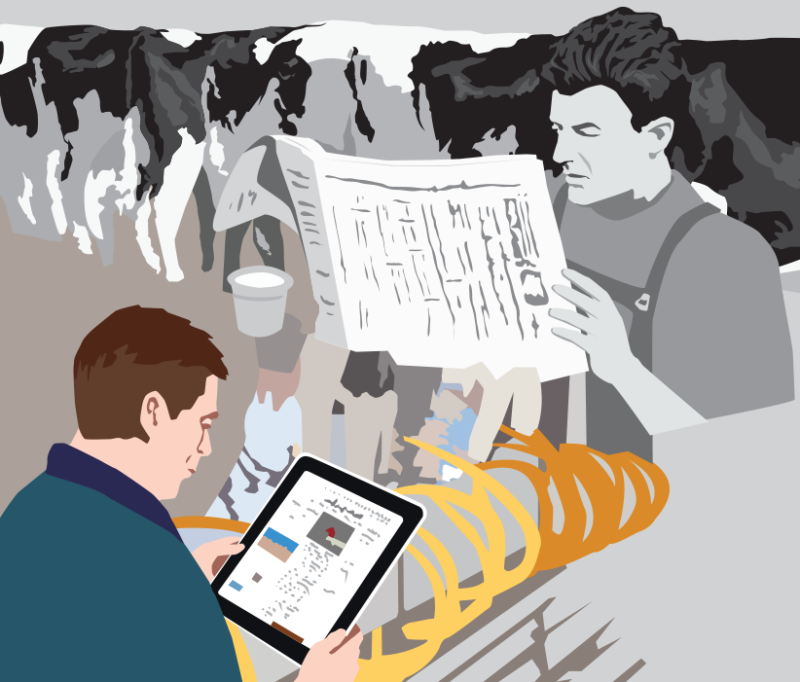A quick Google search, however, reveals that most of these books are memoirs about urban people raising chickens in their backyards, handbooks on growing vegetables for farmers’ markets and pop culture treatments of the food system as a whole. There are few books that fully delve into traditional farming industries and their history, and perhaps more importantly, consider their current challenges.
What follows are five comprehensive, readable and substantive books that evaluate the nature of the farming business from different perspectives. Most of them have been written by farmers themselves and offer something for those who work in agriculture. They provide various viewpoints on the political decisions made in the industry, as well as how these decisions have informed the state of modern farming.
1. The Unsettling of America (1977) by Wendell Berry
Wendell Berry is considered the pre-eminent writer in the field of agriculture, publishing over 80 books of fiction, poetry, essays and criticism. Still, it is his ideas about farming – mostly notably captured in The Unsettling of America – that make him more relevant today than ever.
In 1977, the same year The Unsettling of America was published, Berry famously debated Earl Butz, the U.S. secretary of agriculture. Earl Butz favored expansion in the industry, pushing his “Go big or go home” ideology (which eventually contributed to the 1980s farm crisis). Berry, instead, insisted that there is a specific culture around family farming that leads to healthier rural communities, better stewardship of the land and a more fulfilling lifestyle. These ideas are unavoidable in all of his work but are presented in their distillate form in The Unsettling of America, which warns of the consequences of not protecting small-scale agriculture.
At the time, Berry was largely viewed as an academic liberal who was out of touch. Now he is the writer everyone turns to in matters of agriculture. As he concludes about The Unsettling of America, “This book has not had the happy fate of being proved wrong.”
2. Milk Money: Cash, Cows and the Death of the American Dairy Farm (2012) by Kirk Kardashian
Kirk Kardashian traces the entirety of the American dairy industry, from the first humans who milked cows thousands of years ago to the state of the dairy sector in 2012. He takes in how all stakeholders in farming have been affected by changes through the years, including the farmers, the workers and the animals. Grounding the book in Vermont agriculture, he follows the stories of several family farms in the area.
While the book is meant to provide a comprehensive perspective for a non-farming audience, there are chapters that would also interest farmers themselves. I found it useful how he traces the rise and fall of the Federal Milk Marketing Orders (in particular the Northeast Dairy Compact), as well as the events that led to the Dairy Farmers of America scandal. Nowhere else have these incidents been summarized so completely and neatly in a book.
3. Working the Garden: American Writers and the Industrialization of Agriculture (2001) by William Conlogue
As the number of farms disappear around the world, so does the presence of agriculture in various types of discussions, including literary research. Presently, William Conlogue is one of the few academics who have written books about farm novels and the lived experiences of the farmers that inform them.
The son of a Pennsylvania dairy farmer, Conlogue explores how American writers have traditionally approached the debate of whether small or large agriculture is best for the nation. In accessible language, he breaks down the ways in which farming has typically been presented in literature through the years and considers the aspects of race, gender, class and the environment. Working the Garden helps reignite a dialogue about agricultural writers in the field of literary academics, where it had gone silent for many decades.
4. Farming While Black (2018) by Leah Penniman
Today, only 2% of farms are owned by the black population. Not only are the majority of farmers white, but so are the characters and authors of most books about farming.
Leah Penniman is founder of Soul Fire Farm, which is a community agriculture project that works toward ending racism and injustice in the food system. In building upon the program, Farming While Black provides a manual for entering into different farming practices without previous experience, explained in a manner that is grounded in the African-American experience. From raising chickens to advice on how to introduce agriculture to youth, Farming While Black aims to make farming as accessible as possible for black individuals.
5. Willard Cochrane and the American Family Farm (2000) by Richard A. Levins
Willard Cochrane was the U.S. Department of Agriculture’s head agricultural economist in the 1960s during the John F. Kennedy presidency. He famously coined the term “technology treadmill,” which predicted that, if left to the free market, farms will have to keep getting bigger to stay alive, forcing smaller operations out of the industry.
Although he was proved right in the decades that followed his service to the USDA, at the time he was attacked for his ideas and labeled a communist. Willard Cochrane and the American Family Farm details an interesting and in-depth look at one man’s fight within Washington to save family farming and, ultimately, the price he paid for it.
If you have any thoughts on the books above or would like to suggest your own, feel free to join the conversation at The Milk House.





